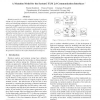Free Online Productivity Tools
i2Speak
i2Symbol
i2OCR
iTex2Img
iWeb2Print
iWeb2Shot
i2Type
iPdf2Split
iPdf2Merge
i2Bopomofo
i2Arabic
i2Style
i2Image
i2PDF
iLatex2Rtf
Sci2ools
140
Voted
DATE
2008
IEEE
2008
IEEE
A Mutation Model for the SystemC TLM 2.0 Communication Interfaces
Mutation analysis is a widely-adopted strategy in software testing with two main purposes: measuring the quality of test suites, and identifying redundant code in programs. Similar approaches are applied in hardware verification and testing too, especially at RTL or gate level, where mutants are generally referred as faults, and mutation analysis is performed by means of fault modeling and fault simulation. However, in modern embedded systems there is a close integration between HW and SW parts, and verification strategies should be applied early in the design flow. This requires the definition of new mutation analysis-based strategies that work at system level, where HW and SW functionalities are not partitioned yet. In this context, the paper proposes a mutation model for perturbing transaction level modeling (TLM) SystemC descriptions. In particular, the main constructs provided by the SystemC TLM 2.0 library have been analyzed, and a set of mutants is proposed to perturb the p...
| Added | 29 May 2010 |
| Updated | 29 May 2010 |
| Type | Conference |
| Year | 2008 |
| Where | DATE |
| Authors | Nicola Bombieri, Franco Fummi, Graziano Pravadelli |
Comments (0)

